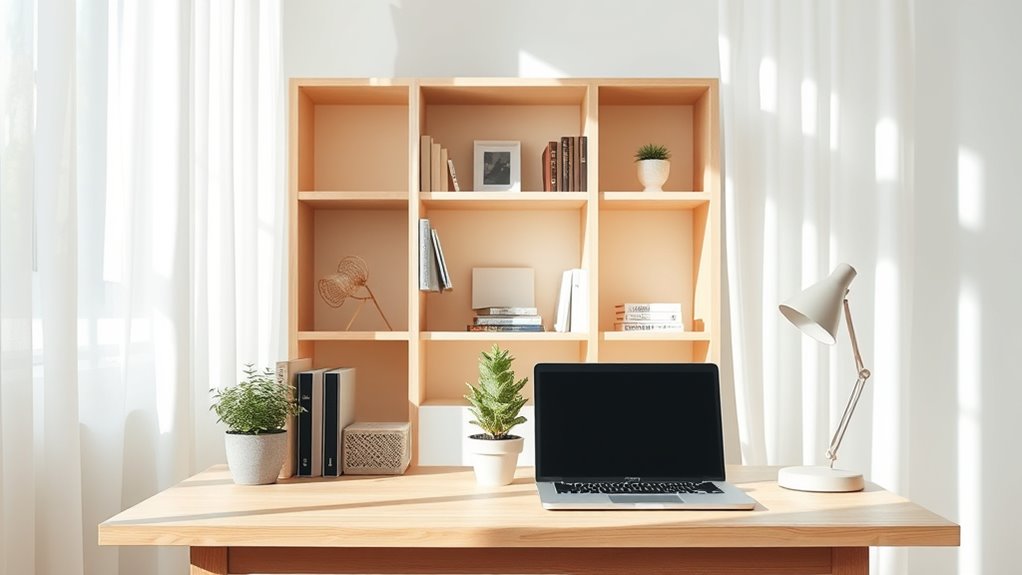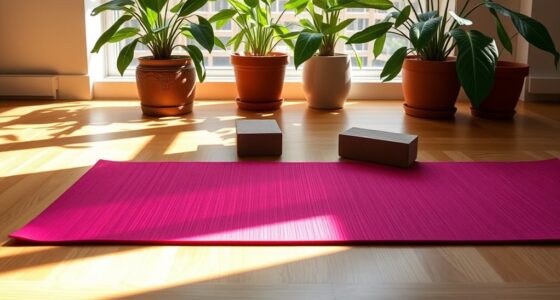Decluttering your space can clear both physical and mental clutter, helping you feel more focused and calm. When you remove unnecessary items, you reduce chaos that mirrors overwhelm inside your mind. This mindful process encourages you to reflect on what truly matters and release emotional attachments. As you create a more organized environment, you’ll notice your clarity improves and stress lessens. Keep exploring how intentional decluttering can transform your mental well-being even further.
Key Takeaways
- Decluttering reduces physical chaos, which can help clear mental clutter and improve focus.
- Mindful organization fosters present-moment awareness and emotional release.
- Letting go of sentimental items can alleviate emotional burdens and promote mental clarity.
- Regular decluttering creates a peaceful environment that supports stress reduction and decision-making.
- Cultivating awareness during decluttering enhances self-reflection and aligns your space with your true self.

Have you ever noticed how a cluttered space can make your mind feel overwhelmed? It’s as if the chaos outside mirrors your inner state, creating a cycle that’s hard to break. Decluttering isn’t just about tidying up; it’s a powerful way to foster mindful organization and facilitate emotional release. When you intentionally sort through your belongings, you’re not only removing physical clutter but also clearing mental space. This act encourages you to be present in the moment, making thoughtful decisions about what to keep and what to let go. As you do so, you engage in mindful organization, which helps you regain control over your environment and your thoughts.
A cluttered space mirrors an overwhelmed mind, but mindful decluttering restores clarity and emotional balance.
By approaching decluttering with mindfulness, you give yourself permission to pause and reflect on each item’s significance. Instead of mindlessly tossing things aside, you consider whether these possessions truly serve your current life. This deliberate process can unearth emotional attachments, memories, or feelings tied to certain objects. Recognizing these emotional ties allows for emotional release, enabling you to let go of past burdens or outdated identities stored in your belongings. As you release these emotional weights, you create space for new experiences and perspectives. This emotional liberation often leads to a sense of relief and clarity, making your environment feel lighter and more manageable.
Mindful organization isn’t just about neatly stacking things or dusting shelves; it’s about cultivating a deeper awareness of your relationship with your possessions. When you organize intentionally, you develop a habit of evaluating what truly matters, which extends beyond your physical space into your mental and emotional well-being. This process can be surprisingly therapeutic, as it encourages you to confront and release feelings of guilt, regret, or attachment that may have been weighing you down. You start to see decluttering as a form of self-care—an act that nurtures your mental health and emotional resilience.
Additionally, understanding the importance of regular maintenance can help sustain the mental clarity achieved through decluttering, reinforcing the benefits over time. As you continue practicing mindful organization and emotional release, you’ll notice your mental clarity improving. With less physical and emotional clutter, your mind becomes sharper, your decision-making more straightforward, and your stress levels lower. Decluttering transforms from a chore into a mindful ritual that supports your overall well-being. It’s a conscious effort to create a space that reflects your true self—free from excess, rich in purpose, and open to growth. In doing so, you reclaim your mental space and foster a calmer, more centered outlook on life.
Frequently Asked Questions
How Long Does It Take to See Mental Clarity Benefits?
You can start noticing mental clarity benefits within a few days to a week, but it varies based on your efforts and emotional responses. In this timeframe, you’ll likely feel less overwhelmed and more focused. Keep in mind, consistent decluttering helps reinforce these positive feelings. Patience is key, as emotional responses can influence how quickly you experience these mental benefits, but with ongoing effort, clarity will become more prominent.
Can Decluttering Improve Mental Health Disorders?
Think of decluttering as a revitalizing gust for your mind. It can considerably improve mental health disorders by enhancing space organization, which reduces feelings of chaos and overwhelm. When you create a tidy environment, you promote emotional well-being, helping you feel more in control. While it’s not a cure-all, decluttering supports mental health by fostering calm and clarity, making it easier to manage stress and anxiety.
What if I Feel Overwhelmed During Decluttering?
If you feel overwhelmed during decluttering, take a deep breath and pause. Use mindfulness techniques like grounding exercises to stay present and manage stress. Break the task into smaller, manageable steps to avoid feeling overwhelmed. Don’t hesitate to seek emotional support from friends or a counselor if needed. Remember, it’s okay to take breaks and go at your own pace—your mental well-being is the priority.
Is There an Ideal Time to Start Decluttering?
You can start decluttering anytime you want—no need to wait for the perfect moment. Timing considerations matter, but don’t let them paralyze you; even a tiny, chaotic corner can transform your mental space. Seasonal decluttering is great, like spring cleaning, but any time of year works if you’re motivated. Pick a day that feels right, and commit. Your clutter won’t stand a chance against your determination!
How Often Should I Declutter for Mental Clarity?
You should declutter regularly, perhaps every few months, to maintain mental clarity. Incorporating consistent organizing routines helps prevent buildup of clutter, making the process easier. Be mindful of emotional attachment, which can slow you down; tackle items with kindness and patience. Regular decluttering keeps your space peaceful, so you feel more focused and in control. Adjust frequency based on your lifestyle and emotional needs, but stay committed to ongoing organization.
Conclusion
By decluttering your space, you’re not just tidying up; you’re creating a sanctuary for your mind to breathe, much like Athena’s wisdom emerging from chaos. As you let go of unnecessary clutter, you invite clarity and focus into your life, transforming disorder into harmony. Remember, the path to mental clarity begins with small, intentional steps—just as a sculptor reveals beauty by chipping away the excess. Embrace this journey, and watch your mind flourish.









